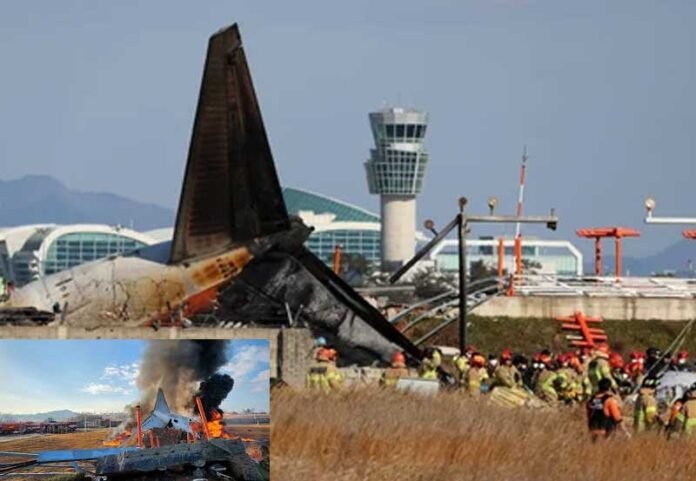In a tragic aviation disaster, a passenger plane carrying 175 passengers and six crew members crashed while attempting to land at Muan International Airport in southern South Korea. The crash has left investigators scrambling to determine the exact cause, with preliminary findings pointing to a bird strike incident. The ill-fated flight, operated by Jeju Air, originated from Thailand and ended in catastrophe as it approached its destination.
Moments before the crash, a passenger aboard the aircraft sent a haunting message to relatives. He reported, “A bird is stuck in the wing of our plane,” and followed it with a chilling statement: “Shall I say my last word?” Tragically, neither the passenger nor the pilot survived the crash.

The pilot also sent a distress call to air traffic control, issuing a “May Day” signal and requesting an emergency landing. South Korea’s Ministry of Communications revealed that the pilot attempted to land the aircraft from the opposite direction in a desperate maneuver to avoid further complications. However, the plane crashed shortly after the distress call, scattering debris near the runway.
Out of the 181 people on board, only two crew members survived the crash. Both were seated near the tail section of the aircraft, which sustained less damage compared to other parts. However, their conditions remain critical as they undergo intensive treatment at a local hospital. South Korea’s Ministry of Transport confirmed that all other passengers and crew perished in the crash.

Rescue teams described the crash site as devastating, with the aircraft rendered unrecognizable. Emergency responders worked tirelessly to retrieve bodies and search for any potential survivors amid the wreckage.
Investigators are focusing on the possibility of a bird strike as the primary cause of the crash. A South Korean official disclosed that the control tower at Muan International Airport had issued a bird strike warning moments before the incident. Shortly after the warning, the pilot reported an emergency, indicating significant damage to the aircraft.
“The pilots issued a May Day call approximately one minute before the crash,” said an official from the Ministry of Communications. Efforts to land the plane on the runway were unsuccessful, resulting in the catastrophic impact.
The aircraft, built in 2009, was nearing the end of its standard operational lifespan. Officials from South Korea’s Aviation Safety Authority are examining the maintenance records and operational history of the plane to rule out any mechanical failures or negligence.
Bird strikes are a recognized hazard in aviation, particularly during takeoff and landing. While modern aircraft are designed to withstand minor bird strikes, larger incidents can cause severe damage to engines and other critical components. The International Civil Aviation Organization (ICAO) has emphasized the need for robust bird control measures around airports to mitigate such risks.

In this case, investigators are also reviewing the airport’s wildlife management protocols to determine whether adequate preventive measures were in place. The incident has sparked renewed calls for stricter international standards to address the bird strike hazard.
At Muan International Airport, grief-stricken families of the victims have gathered, demanding answers and updates on the ongoing investigation. Temporary shelters have been set up for the relatives, who await the identification of their loved ones. Many expressed frustration over the lack of immediate information and transparency from authorities.
One relative, Mrs. Kim, tearfully recounted her last conversation with her husband, who was on the flight: “He said everything was fine when they took off. How could this happen?”
Jeju Air has pledged full cooperation with investigators and announced plans to compensate the victims’ families. However, critics argue that such measures do little to ease the pain of those affected by the tragedy.
South Korea’s Aviation Safety Board (SKASB) is leading the investigation, with assistance from international experts and the aircraft’s manufacturer. The black box recorders have been recovered and are being analyzed for critical data on the flight’s final moments.

Initial findings from the investigation are expected within weeks. Authorities are also inspecting the airport’s radar and wildlife detection systems, as well as interviewing air traffic control staff and ground personnel.
The crash has reignited global concerns about aviation safety, particularly regarding bird strikes and their impact on modern aircraft. Aviation experts stress the need for advanced bird detection systems and better pilot training to handle emergencies caused by wildlife.
The tragedy at Muan International Airport stands as a somber reminder of the inherent risks of air travel. As investigators work to uncover the truth, the aviation community and the public at large hope for meaningful changes to prevent similar incidents in the future.




